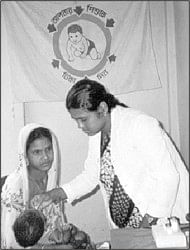Rights monitor
Health rights in Bangladesh

The Constitution of the Peoples' Republic of Bangladesh recognises health as a basic necessity of life and one of the 'fundamental responsibilities of the state' to the citizens. Individual citizen irrespective of cast, creed, colour, sex and class has the constitutional right to have basic health service.
The current regulatory framework
The existing regulatory framework for monitoring health service delivery either in the public or private sector remains weak. There are 45 laws related to various aspects of health2. For example, laws related to specific diseases/health situations such as Epidemic Disease Act (1897), Prevention of Malaria Ordinance (1978), Eye Surgery (Restriction) Ordinance (1960); laws related to breast milk substitute, quality of food, quality of drugs, use of narcotic, women and children's health, health of labourers, environmental pollution and so on. None of these laws deal directly with patients'/health consumers' rights.
The country adopted a National Health Policy in 2000 with fifteen aims and objectives. These objectives include: development of nutrition and public health, accessible health services for the poor and rural population, primary healthcare for the Upazila and Union Council, reduction of material mortality, development of reproductive health, up-gradation and modernisation of health services, introduction of family planning methods for the ultra poor, special provision for the mentally and physically handicapped population etc3.
Bangladesh, with an area of 147,570sq km has a population of 140 million, which is one of the highest densely populated countries in the world with an annual growth rate of 1.48%1. The Human Development Index (HDI) for Bangladesh is 0.530, which gives Bangladesh a rank of 137th out of 177 countries as presented in the Human Development Report (HDR) 2006 by United Nations Development Programme (UNDP).
Consumers rights in Bangladesh
This is still a neglected area in Bangladesh and most of the consumers are not aware of their rights. Health consumers are deprived of their rights in Bangladesh and the patients' rights are seriously undermined in the country. Harassment, negligence, abusive behaviour, unethical practices are very common in the health care delivery system. The issue is neglected due to absence of enforcing laws to protect the interests of the consumers. The consumers have not also organised themselves to raise their voices that could create pressures among the policy makers, law-enforcing agencies and the service providers. There are no pioneering consumers' representative organisations in the country except the Consumers' Association of Bangladesh (CAB) that has been persuading for establishing the Consumers' Protection Act since 1995.
Health consumers' rights in Bangladesh
The Ministry of Health and Family Welfare, in 1998 promulgated the Clients' Charter of Rights and the Providers' Charter of Rights. Both the charters have been publicised/circulated to a limited extent since then, but no effective steps have yet been taken to implement the rights mentioned in the charters.
Consumers' rights versus Responsibilities
#Responsible consumer behaviour is essential for realising consumers' rights
#Consumers' responsibilities include:
* Developing active partnership with providers
* Open communication with provider
* Maintaining records properly
* Respecting providers' rights
#Consumers' need also to organise themselves:
* to work as caretakers of the CPA
* to provide feedback to appropriate authorities
* to provide support to affected consumers
* to participate in consumers' education
# Role of civil society and governments to facilitate establishment and functioning of such groups and the way forward:
* to implement BMDC Code of Ethics
* to adopt Clients Charter of Rights
* to organise Consumer Groups
* to initiate Private Practice and Private Clinics and Laboratories Ordinance to establish Advocacy Groups
Source: Marie Stopes.